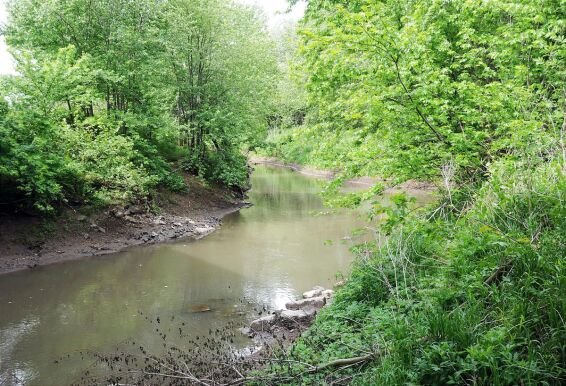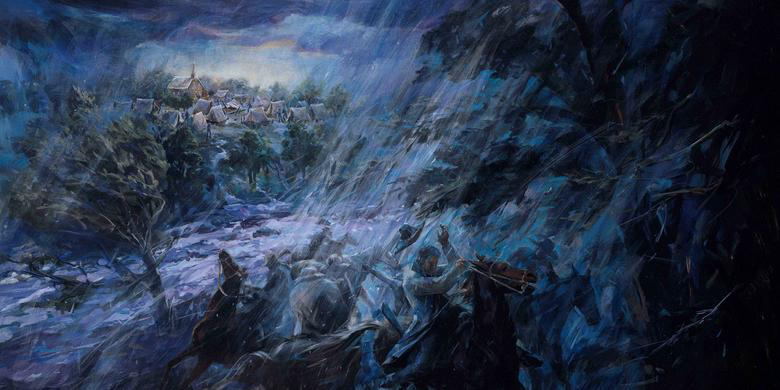
For the origin of Zions Camp start here. Joseph Smith organized Zions Camp to help the Missouri Saints who had been kicked out of their homes. The men who joined Zions Camp were expecting to fight and give their lives to the Lord, fighting for the men and women of the Church who had been displaced by the Missouri Mob.
Joseph Smith said:
“Notwithstanding our enemies were continually breathing threats of violence, we did not fear, neither did we hesitate to prosecute our journey, for God was with us, and His angels went before us, and the faith of our little band was unwavering. We know that angels were our companions, for we saw them. (History of the Church, 2:73.)
While researching Historian Milton V. Blackman Jr. made this analysis of Zions Camp:
”In other respects, Zions Camp was not like an ordinary army. These men were heading west in compliance with what they believed to be a commandment of the Lord and they were being led by a prophet of God. During the journey their commander-in-chief- preached the doctrines of the kingdom to them. Every morning and evening the soldiers offered prayers in their tents. On Sunday, the men would usually rest and hold meetings, where they would hear sermons and partake of the sacrament.”
Battle for the Lord

Zions Camp was different then was expected. Zions camp never ended up fighting anyone. The Lord took care of their enemies. It’s a pretty awesome story, the Latter-Day Saint men were met by five armed men informing the Saints they would “see hell before morning.” The armed visitors said there were 130 Missouri mob men coming from Richmond, 70 coming from Clay County and 200 men coming from Jackson County.
It’s a good thing the Lord watches over his Saints, because the “battle” was very different than they had planned, here is what happened in the words of Wilford Woodruff:
“When the five men entered the camp there was not a cloud to be seen in the whole heavens, but as the men left the camp there was a small cloud like a black spot appeared in the north west, and it began to unroll itself like a scroll, and in a few minutes the whole heavens were covered with a pall as black as ink. This indicated a sudden storm which soon broke upon us with wind, rain, thunder and lightning and hail. Our beds were soon afloat and our tents blown down over our heads. We all fled into a Baptist meetinghouse. As the Prophet Joseph came in shaking the water from his hat and clothing he said, “Boys, there is some meaning to this. God is in the storm”. We sang praises to God, and lay all night on benches under cover while our enemies were in the pelting storm. It was reported that the mob cavalry who fled into the schoolhouse had to hold their horses by the bridles between the logs, but when the heavy hail storm struck them they broke away, skinning the fingers of those who were holding them. The horses fled before the storm and were not found for several days. It was reported that the captain of the company in the schoolhouse said it was a strange thing that they could do nothing against the Mormons but what there must be some hail storm or some other thing to hinder their doing anything, but they did not feel disposed to acknowledge that God was fighting our battles.”
The storm scattered the mob!
Cholera Outbreak of Zions Camp
A few days later this band of faithful men of the Lord were exposed to cholera. Seventy people of this group were stricken and thirteen died. Sidney Gilbert had opened his land to the group of Zions marchers and he contracted cholera and died.
Joseph Smith:
“I have seen those men who died of the cholera in our camp; and the Lord knows, if I get a mansion as bright as theirs, I ask no more," said Joseph Smith of those who served in Zion's Camp. Then he wept and continued: "I wish you to notify all the brethren living in the branches, within a reasonable distance from this place, to meet at a general conference on Saturday next [February 14, 1835]. I shall then and there appoint twelve Special Witnesses, to open the door of the Gospel to foreign nations, and you [Brigham Young] will be one of them. (History of the Church, 2:181.)
Outcome of Zions Camp
One of the unintended consequences of Zions Camp is all the leadership of the Church that came from this group of men willing to give their lives for the Lord. 9 of the first twelve Apostles participated in Zions Camp as did ALL of the first quorum of the seventy.
Joseph Smith”
“Brethren, some of you are angry with me, because you did not fight in Missouri; but let me tell you, God did not want you to fight. He could not organize his kingdom with twelve men to open the gospel door to the nations of the earth, and with seventy men under their direction to follow in their tracks, unless he took them from a body of men who had offered their lives, and who had made as great a sacrifice as did Abraham.
Now, the Lord has got his Twelve and his Seventy, and there will be other quorums of Seventies called, who will make the sacrifice, and those who have not made their sacrifices and their offerings now, will make them hereafter. (Quoted in Joseph Young Sr., History of the Organization of the Seventies (1878), 14.)
Testimonies built:
Wilford Woodruff:
“We were young men, and were called upon in that early day to go up and redeem Zion, and what we had to do we had to do by faith. . . . We gained an experience that we never could have gained in any other way. We had the privilege of beholding the face of the prophet, and we had the privilege of traveling a thousand miles with him, and seeing the workings of the spirit of God with him, and the revelations of Jesus Christ unto him and the fulfilment of those revelations. . . . Had I not gone up with Zion's Camp I should not have been here to-day [Salt Lake City, December 1869], and I presume that would have been the case with many others in this Territory. By going there we were thrust into the vineyard to preach the gospel, and the Lord accepted our labors. And in all our labors and persecutions, with our lives often at stake, we have had to work and live by faith. (Deseret News, Dec. 22, 1869, 543.)
George A. Smith:
The Prophet Joseph took a full share of the fatigues of the entire journey [of Zion's Camp]. In addition to the care of providing for the Camp and presiding over it, he walked most of the time and had a full proportion of blistered, bloody, and sore feet, which was the natural result of walking from 25 to 40 miles a day in a hot season of the year. But during the entire trip he never uttered a murmur or complaint, while most of the men in the Camp complained to him . . . and many of us were prayerless, thoughtless, careless, heedless, foolish or devilish, and yet we did not know it. Joseph had to bear with us and tutor us, like children. There were many, however, in the Camp who never murmured and who were always ready and willing to do as our leaders desired. ("My Journal," The Instructor, May 1946, 217.)
More Blog Posts:
Get to know the Prophet Brigham Young
Places to Visit:
Big Fishing and Little Fishing River in Clay County Missouri
Historic Kirtland Ohio
Hauns Mill
